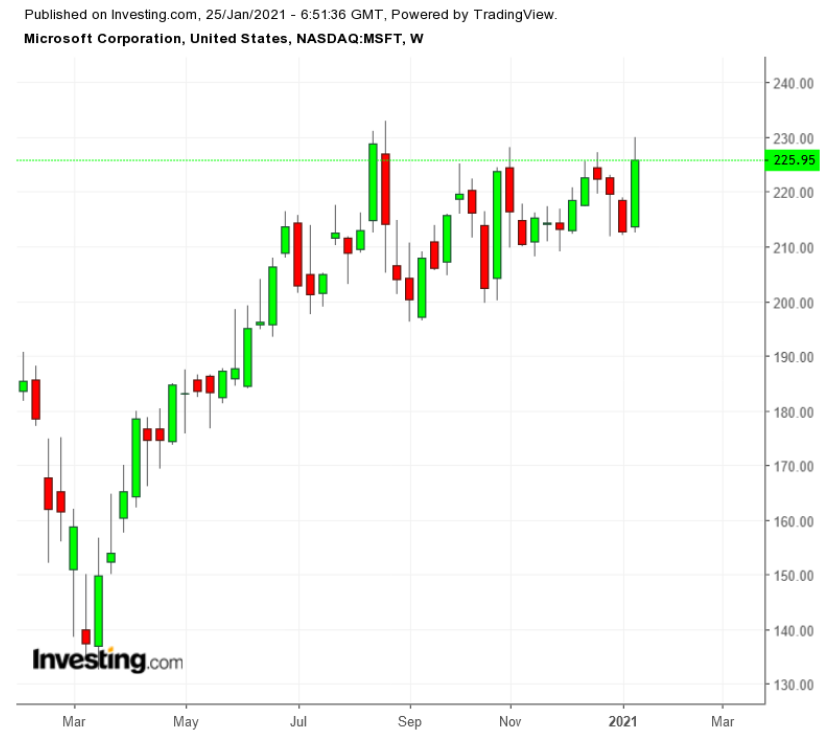S&P 500 jumps as tech rallies as investors eye end of government shutdown
-
Reports Q2, 2021 results on Tuesday, Jan. 26, after the market close
-
Revenue Expectation: $40.23 billion
-
EPS Expectation: $1.64
When tech giant Microsoft (NASDAQ:MSFT) releases its latest quarterly earnings tomorrow, investors will be keen to know whether the pandemic-driven surge in demand will roll over to 2021.
The Redmond, Washington-based software behemoth has been a net beneficiary during the pandemic which forced workers to stay at home, and connect through devices and services that the company sells.

Since the pandemic started, businesses have accelerated a shift to Microsoft’s Azure internet-based computing services as well as to online subscriptions for Office software that come with teleconferencing programs and work-from-home tools. In the previous quarter, Azure revenue rose 48%, compared with a 47% gain in the prior quarter.
For three years running, revenue from Azure has almost doubled each quarter, and that rate of growth rate has been closely minitored by investors.
Helped by this unexpected demand surge, Microsoft shares gained about 35% over the past year. This rally pushed the company’s market cap to more than $1.7 trillion, making it one of the most valuable entities in the world.
But, during the past three months, MSFT stock has underperformed the benchmark NASDAQ. As such, investors are now looking for additional evidence of Microsoft's market share gains, especially in the cloud-computing segment where the company competes fiercely with Amazon's (NASDAQ:AMZN) Web Service product.
Strategic Cloud Shift
Though there is no evidence that Microsoft's dominance is under threat, its latest earnings need to show that these are the products that could continue fuelling sales this year.
During the last quarter, MSFT launched a new version of its Xbox video-game console as part of its push to entice users by offering payment plans, a cheaper model that will go for $300, and programs that give buyers a new machine and a subscription with hundreds of games for a monthly fee.
Chief Financial Officer Amy Hood, according to Bloomberg, expects strong demand for the new console, forecasting gaming hardware sales to rise 40% in the previous period. Analyst Daniel Ives, who has an outperform rating and a $260 price target on Microsoft, said in a recent note that the current work-from-home environment "is further catalyzing more enterprises to make the strategic cloud shift with Microsoft across the board with Azure growth remaining brisk." He added:
"This cloud shift and (work from home) dynamic looks here to stay and the company stands to be a major beneficiary of this trend on its flagship Azure/Office 365 franchise over the coming years."
Microsoft “represents a rare combination of strong secular positioning and a reasonable valuation,” Morgan Stanley analyst Keith Weiss wrote in a research note last week naming the stock as a top pick.
For long-term investors, there is no threat on the horizen. Microsoft remains one of the safest bets in the technology space, given the company’s attractive dividend policy. Since 2004, when the tech giant first began paying a dividend, its payout has swelled more than four-fold.
Currently, its annual yield is 1% with a quarterly payout of $0.56 per share, after incorporating a 10% dividend hike announced in September.
Bottom Line
MSFT is continuing to expand its market share into new areas of the digital economy while maintaining its leading position with legacy software products such as Windows and Office.
This durable advantage will help the company achieve sustained, double-digit growth in revenue, earnings per share and free cash flow, making it a reliable tech stock to own over the long term.
